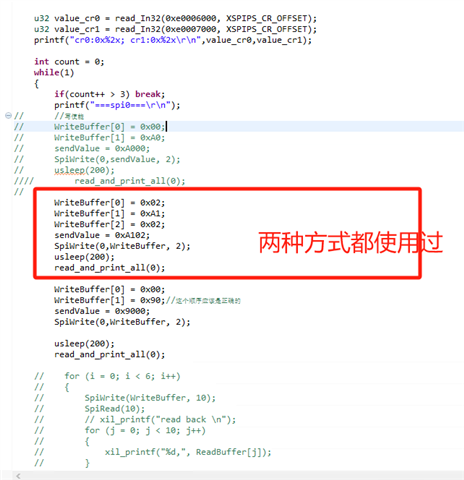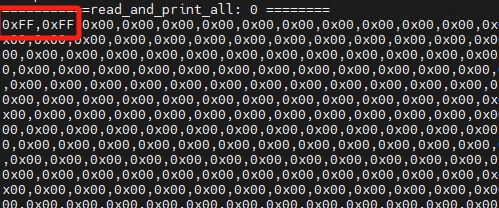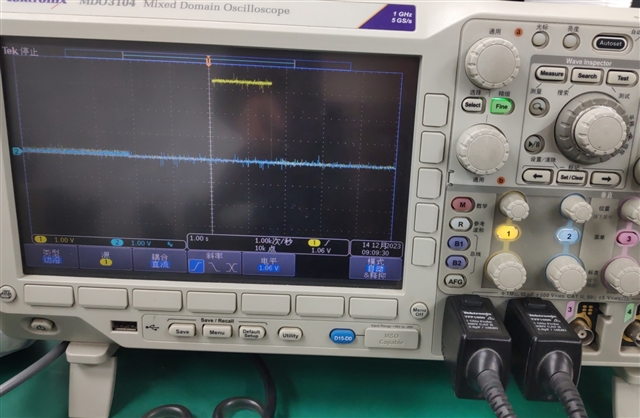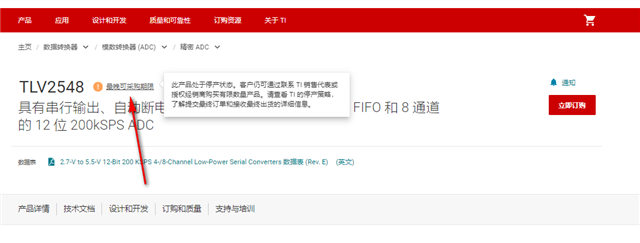 这是代码,两种方式都时使用过, 先发送0XA000到TLV2548, 再发送0xa102设置寄存器,56位为0:0. 最后使用0x9000读取CFR值,然后读取的值不是上一步写入的0x102。
这是代码,两种方式都时使用过, 先发送0XA000到TLV2548, 再发送0xa102设置寄存器,56位为0:0. 最后使用0x9000读取CFR值,然后读取的值不是上一步写入的0x102。
 读出的值为0xffff。 这是为什么呢?
读出的值为0xffff。 这是为什么呢?
This thread has been locked.
If you have a related question, please click the "Ask a related question" button in the top right corner. The newly created question will be automatically linked to this question.
 我测量了时钟和cs片选信号,然后使用该代码进行发送和接收数据时,发现cs有从高到低的转换,cs应该是正常的,但是时钟没有信号。这个问题能确定是由spi master controler出现了问题是吗?感谢。
我测量了时钟和cs片选信号,然后使用该代码进行发送和接收数据时,发现cs有从高到低的转换,cs应该是正常的,但是时钟没有信号。这个问题能确定是由spi master controler出现了问题是吗?感谢。
int main(void)
{
int Status;
int i, j;
int value;
u16 sendValue = 0;
xil_printf("====SPI Selftest Example =======\r\n");
Status = spi0_init();
if (Status != XST_SUCCESS)
{
xil_printf("SPI0 Selftest Example Failed\r\n");
return XST_FAILURE;
}
Status = spi1_init();
if (Status != XST_SUCCESS)
{
xil_printf("SPI1 Selftest Example Failed\r\n");
return XST_FAILURE;
}
memset(WriteBuffer,0,1024);
// read_and_print_all();
u32 value_cr0 = read_In32(0xe0006000, XSPIPS_CR_OFFSET);
u32 value_cr1 = read_In32(0xe0007000, XSPIPS_CR_OFFSET);
printf("cr0:0x%2x; cr1:0x%2x\r\n",value_cr0,value_cr1);
int count = 0;
//
// WriteBuffer[0] = 0x00;
// WriteBuffer[1] = 0x80;
// sendValue = 0x8000;
// SpiWrite(0,sendValue, 2);
// usleep(200);
////写使能, 加这个代码,才会有CS信号的跳变,不然CS没有反应
#if 1
WriteBuffer[0] = 0x00;
WriteBuffer[1] = 0xA0;
sendValue = 0xA000;
SpiWrite(0,WriteBuffer, 2);
usleep(200);
read_and_print_all(0);
#endif
while(1)
{
if(count++ >= 3)
break;
#if 1
printf("===spi0===\r\n");
WriteBuffer[0] = 0x02;
WriteBuffer[1] = 0xa1;
sendValue = 0xA102;
SpiWrite(0,sendValue, 3);
usleep(200);
// read_and_print_all(0);
sleep(1);
WriteBuffer[0] = 0x99;
WriteBuffer[1] = 0x90;//这个顺序应该是正确的
sendValue = 0x9000;
SpiWrite(0,sendValue, 2);
usleep(2000);
read_and_print_all(0);
sleep(1);
#endif
#if 0
printf("===spi1===\r\n");
WriteBuffer[0] = 0xA0;
WriteBuffer[1] = 0x00;
SpiWrite(1,WriteBuffer, 2);
usleep(200);
WriteBuffer[0] = 0xA1;
WriteBuffer[1] = 0x02;
SpiWrite(1,WriteBuffer, 2);
usleep(200);
WriteBuffer[0] = 0x90;
WriteBuffer[1] = 0x90;
SpiWrite(1,WriteBuffer, 2);
usleep(200);
read_and_print_all(1);
#endif
}
xil_printf("\r\nSuccessfully ran SPI Selftest Example\r\n\r\n");
return XST_SUCCESS;
}完整代码如下:
#include "xparameters.h"
#include "xspips.h"
#include "xil_printf.h"
#include "sleep.h"
#include "xspips_hw.h"
XSpiPs Spi0, Spi1;
#define SpiPs_RecvByte(BaseAddress) \
(u8) XSpiPs_In32((BaseAddress) + XSPIPS_RXD_OFFSET)
#define SpiPs_SendByte(BaseAddress, Data) \
XSpiPs_Out32((BaseAddress) + XSPIPS_TXD_OFFSET, (Data))
int spi0_init();
void spi0_one_write();
void SpiRead(u8 spiNum, int ByteCount);
void SpiWrite(u8 spiNum, u8 *Sendbuffer, int ByteCount);
unsigned char ReadBuffer[1024];
unsigned char WriteBuffer[1024] = {1, 2, 3, 4, 5, 6, 7, 8, 9, 0};
void read_and_print_all(u8 spiNum)
{
xil_printf("===========read_and_print_all: %d ========\r\n",spiNum);
memset(ReadBuffer, 0x00, 1024);
if(spiNum == 0)
SpiRead(0,512);
else
SpiRead(1,512);
for (int j = 0; j < 512; j++)
{
xil_printf("0x%02x,", ReadBuffer[j]);
}
xil_printf("\r\n");
}
static INLINE u32 read_In32(UINTPTR Addr, u32 offset)
{
return *(volatile u32 *) (Addr+offset);
}
int main(void)
{
int Status;
int i, j;
int value;
u16 sendValue = 0;
xil_printf("====SPI Selftest Example =======\r\n");
Status = spi0_init();
if (Status != XST_SUCCESS)
{
xil_printf("SPI0 Selftest Example Failed\r\n");
return XST_FAILURE;
}
Status = spi1_init();
if (Status != XST_SUCCESS)
{
xil_printf("SPI1 Selftest Example Failed\r\n");
return XST_FAILURE;
}
memset(WriteBuffer,0,1024);
// read_and_print_all();
u32 value_cr0 = read_In32(0xe0006000, XSPIPS_CR_OFFSET);
u32 value_cr1 = read_In32(0xe0007000, XSPIPS_CR_OFFSET);
printf("cr0:0x%2x; cr1:0x%2x\r\n",value_cr0,value_cr1);
int count = 0;
//
// WriteBuffer[0] = 0x00;
// WriteBuffer[1] = 0x80;
// sendValue = 0x8000;
// SpiWrite(0,sendValue, 2);
// usleep(200);
////写使能, 加这个代码,才会有CS信号的跳变,不然CS没有反应
#if 1
WriteBuffer[0] = 0x00;
WriteBuffer[1] = 0xA0;
sendValue = 0xA000;
SpiWrite(0,WriteBuffer, 2);
usleep(200);
read_and_print_all(0);
#endif
while(1)
{
if(count++ >= 3)
break;
#if 1
printf("===spi0===\r\n");
WriteBuffer[0] = 0x02;
WriteBuffer[1] = 0xa1;
sendValue = 0xA102;
SpiWrite(0,sendValue, 3);
usleep(200);
// read_and_print_all(0);
sleep(1);
WriteBuffer[0] = 0x99;
WriteBuffer[1] = 0x90;//这个顺序应该是正确的
sendValue = 0x9000;
SpiWrite(0,sendValue, 2);
usleep(2000);
read_and_print_all(0);
sleep(1);
#endif
#if 0
printf("===spi1===\r\n");
WriteBuffer[0] = 0xA0;
WriteBuffer[1] = 0x00;
SpiWrite(1,WriteBuffer, 2);
usleep(200);
WriteBuffer[0] = 0xA1;
WriteBuffer[1] = 0x02;
SpiWrite(1,WriteBuffer, 2);
usleep(200);
WriteBuffer[0] = 0x90;
WriteBuffer[1] = 0x90;
SpiWrite(1,WriteBuffer, 2);
usleep(200);
read_and_print_all(1);
#endif
}
xil_printf("\r\nSuccessfully ran SPI Selftest Example\r\n\r\n");
return XST_SUCCESS;
}
void SpiRead(u8 spiNum, int ByteCount)
{
if(spiNum == 0)
{
int Count;
u32 StatusReg;
StatusReg = XSpiPs_ReadReg(Spi0.Config.BaseAddress,
XSPIPS_SR_OFFSET);
/*
* Polling the Rx Buffer for Data
*/
do
{
StatusReg = XSpiPs_ReadReg(Spi0.Config.BaseAddress,
XSPIPS_SR_OFFSET);
} while (!(StatusReg & XSPIPS_IXR_RXNEMPTY_MASK));
/*
* Reading the Rx Buffer
*/
for (Count = 0; Count < ByteCount; Count++)
{
ReadBuffer[Count] = SpiPs_RecvByte(
Spi0.Config.BaseAddress);
}
}
else
{
int Count;
u32 StatusReg;
StatusReg = XSpiPs_ReadReg(Spi1.Config.BaseAddress,
XSPIPS_SR_OFFSET);
/*
* Polling the Rx Buffer for Data
*/
do
{
StatusReg = XSpiPs_ReadReg(Spi1.Config.BaseAddress,
XSPIPS_SR_OFFSET);
} while (!(StatusReg & XSPIPS_IXR_RXNEMPTY_MASK));
/*
* Reading the Rx Buffer
*/
for (Count = 0; Count < ByteCount; Count++)
{
ReadBuffer[Count] = SpiPs_RecvByte(
Spi1.Config.BaseAddress);
}
}
}
void SpiWrite(u8 spiNum, u8 *Sendbuffer, int ByteCount)
{
if(spiNum == 0)
{
u32 StatusReg;
int TransCount = 0;
StatusReg = XSpiPs_ReadReg(Spi0.Config.BaseAddress,
XSPIPS_SR_OFFSET);
while ((ByteCount > 0) &&
(TransCount < XSPIPS_FIFO_DEPTH))
{
SpiPs_SendByte(Spi0.Config.BaseAddress,
*Sendbuffer);
Sendbuffer++;
++TransCount;
ByteCount--;
}
/*
* Wait for the transfer to finish by polling Tx fifo status.
*/
do
{
StatusReg = XSpiPs_ReadReg(
Spi0.Config.BaseAddress,
XSPIPS_SR_OFFSET);
} while ((StatusReg & XSPIPS_IXR_TXOW_MASK) == 0);
}
else
{
u32 StatusReg;
int TransCount = 0;
StatusReg = XSpiPs_ReadReg(Spi1.Config.BaseAddress,
XSPIPS_SR_OFFSET);
while ((ByteCount > 0) &&
(TransCount < XSPIPS_FIFO_DEPTH))
{
SpiPs_SendByte(Spi1.Config.BaseAddress,
*Sendbuffer);
Sendbuffer++;
++TransCount;
ByteCount--;
}
/*
* Wait for the transfer to finish by polling Tx fifo status.
*/
do
{
StatusReg = XSpiPs_ReadReg(
Spi1.Config.BaseAddress,
XSPIPS_SR_OFFSET);
} while ((StatusReg & XSPIPS_IXR_TXOW_MASK) == 0);
}
}
s32 XSpiPs_SetSlaveSelect(XSpiPs *InstancePtr, u8 SlaveSel);
int spi0_init()
{
int Status;
XSpiPs_Config *SpiConfig;
/*
* Initialize the SPI device.
*/
SpiConfig = XSpiPs_LookupConfig(XPAR_XSPIPS_0_DEVICE_ID);
if (NULL == SpiConfig)
{
return XST_FAILURE;
}
Status = XSpiPs_CfgInitialize(&Spi0, SpiConfig, SpiConfig->BaseAddress);
if (Status != XST_SUCCESS)
{
return XST_FAILURE;
}
/*
* Perform a self-test to check hardware build.
*/
Status = XSpiPs_SelfTest(&Spi0);
if (Status != XST_SUCCESS)
{
return XST_FAILURE;
}
xil_printf("%s self test succ\r\n", __func__);
Status = XSpiPs_SetOptions(&Spi0, XSPIPS_FORCE_SSELECT_OPTION |XSPIPS_MASTER_OPTION);
if (Status != XST_SUCCESS)
{
xil_printf("%s XSpiPs_SetOptions fail\r\n", __func__);
return XST_FAILURE;
}
Status = XSpiPs_SetClkPrescaler(&Spi0, XSPIPS_CLK_PRESCALE_64);
if (Status != XST_SUCCESS)
{
xil_printf("%s XSpiPs_SetClkPrescaler fail\r\n", __func__);
return XST_FAILURE;
}
//lsh
#if 0
XSpiPs_SetSlaveSelect(&Spi0,0);
if (Status != XST_SUCCESS)
{
xil_printf("%s XSpiPs_SetSlaveSelect fail\r\n", __func__);
return XST_FAILURE;
}
#endif
XSpiPs_Enable(&Spi0);
xil_printf("spi 0 config finish\r\n");
return XST_SUCCESS;
}
int spi1_init()
{
int Status;
XSpiPs_Config *SpiConfig;
/*
* Initialize the SPI device.
*/
SpiConfig = XSpiPs_LookupConfig(XPAR_XSPIPS_1_DEVICE_ID);
if (NULL == SpiConfig)
{
return XST_FAILURE;
}
Status = XSpiPs_CfgInitialize(&Spi1, SpiConfig, SpiConfig->BaseAddress);
if (Status != XST_SUCCESS)
{
return XST_FAILURE;
}
/*
* Perform a self-test to check hardware build.
*/
Status = XSpiPs_SelfTest(&Spi1);
if (Status != XST_SUCCESS)
{
return XST_FAILURE;
}
xil_printf("%s self test succ\r\n", __func__);
#if 1
Status = XSpiPs_SetOptions(&Spi1, XSPIPS_MASTER_OPTION);
if (Status != XST_SUCCESS)
{
xil_printf("%s XSpiPs_SetOptions fail\r\n", __func__);
return XST_FAILURE;
}
Status = XSpiPs_SetClkPrescaler(&Spi1, XSPIPS_CLK_PRESCALE_64);
if (Status != XST_SUCCESS)
{
xil_printf("%s XSpiPs_SetClkPrescaler fail\r\n", __func__);
return XST_FAILURE;
}
#endif
XSpiPs_Enable(&Spi1);
xil_printf("spi 1 config finish\r\n");
return XST_SUCCESS;
}
我刚注意到 TLV2548产品首页的状态标黄了,即此产品已经停产了,请知晓这一点:

这个问题能确定是由spi master controler出现了问题是吗?
基本可以确定是spi master的问题,因为TLV2548 的时钟信号是输入,但保险起见建议做以下测试:
spi master 与 TLV2548 时钟信号之间有电阻吗?有的话,建议去掉电阻即悬空master 时钟输出看下master 时钟是否有输出,这样就排除了TLV2548 对此信号的影响。或直接焊掉TLV2548 芯片去测试。